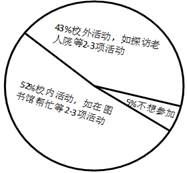
In America, drivers’ education is part of the regular high school curriculum. Every student in his or her second year of high school is required to take a class in driver’s education. However, unlike other courses, it is not given during the regular school year. Instead it is a summer course.
The course is divided into two parts: class time for learning laws and rules and driving time to practice driving. Class time is not unlike any other class. The students study the basic traffic laws from a text to pass the written driving test that is given to anyone who wants to get a driver’s license.
Driving time is a chance for the students to get behind the wheel and practice starting. Each student is required to drive a total of six hours. The students are divided into groups of four. The students and the instructor go out driving for two hours each time. So each student gets half an hour driving time per outing.
Drivers Ed cars are unlike other cars in which they have two sets of brakes(刹车), one on the driver's side and one on the other side where the instructor sits. So if the student driver should run into difficulties, the instructor can take over. The car also has another special feature. On the top of the car is a sign that reads: STUDENT DRIVER. That lets nearby drivers know that they should use extra caution because the student driver is a beginning driver, not very experienced.
After the student has passed the driver's education course and reached the suitable age to drive (this age differs in every state but in most cases the person must be 16 years old), they can go to a the state office to take their driver's test, which is made up of an eye examination, a written test, and a road test. The person must pass all the three tests in order to be given a driver's license.
1.We can infer that the students are required to ________ in their whole driving practice.
A. go out driving for 12 times B. spend at least six hours driving
C. drive for two-hour blocks of time D. get half an hour driving
2.In America, the driver's course mentioned above is ________.
A. considered as part of the advanced education
B. given to anyone wanting to get a driver's license
C. carried on at the same time as other courses
D. required of all the students of Grade 2 in high schools
3.To prevent accidents, a driver's ED car ________.
A. has a sign inside it B. has two sets of brakes
C. is big enough to hold five persons D. can't run very fast
4.Which of the following does not agree with the requirements for the students wanting to get their driver's license?
A. They must be 16 years of age.
B. They should go to have their driver's course.
C. They must have their eyes examined.
D. They ought to do well in their driver's course.
5.The underlined word “caution” in paragraph 4 means ________.
A. being brave B. courage C. being careful D. patience
 名师导航单元期末冲刺100分系列答案
名师导航单元期末冲刺100分系列答案 名校名卷单元同步训练测试题系列答案
名校名卷单元同步训练测试题系列答案科目:初中英语 来源:人教新目标七年级上册Unit1 Section A 练习题 题型:单项填空
—How ______ you?—Fine, thanks.
A. am B. is C. are D. be
查看答案和解析>>
科目:初中英语 来源:江苏省2017届九年级二模联考英语试卷 题型:任务型阅读
It can be a frightening experience for people to visit a new place, because most people are not comfortable with --- English. So how can you keep away from this kind of situation? Learn how to speak English fluently. Here are four English speaking tips you must know to become a more confident English speaker.
1.Listen first.
Listen carefully to understandable English every day. Most people turn to textbooks to study English grammar rules, but you cannot learn the correct English pronunciation of the words only by reading them. You do not need to learn grammar in detail because this can prevent you from speaking English fluently. Instead, listen to how native English speakers pronounce and watch their mouth movements carefully. Also watch English shows and movies to develop your spoken English and improve your vocabulary.
2.Practice makes perfect.
Read aloud in English for 15 to 20 minutes a day in front of the mirror, which helps in pronunciation and improves your English communication skills. Also, practice with your friends and family. Talking with a good English speaker can help improvise (即兴发挥) your usage of words and form of sentences.
3.Think in English.
At the beginning, most English learners usually think of what they have to say in their native language, translate and then say it in English. This can be tiring in the mind. If your goal is to speak English fluently, you need to learn “thinking” in English. Make up the sentences in English as you think about them.
4.Be more confident.
All these tips will be for nothing if you are not that confident in your English speaking skills. It is quite natural to make mistakes when learning a new language.
Try to relax if you’re speaking in English. When you speak at a normal speed, you’ll discover that you will be able to pronounce the words correctly and people will understand you. Most of the time, the person you are talking to even doesn’t know your mistakes.
In a word, learning English does not happen overnight. It takes a lot of time, effort and practice. Don’t lose confidence and never give up. Follow these tips and practice every day. Soon, you would learn to speak English fluently as if it is your own language.
English speaking tips you must know
Introduction | It’s many people’s dream to be 1. to speak English fluently in a new place. |
Listen first | Remembering grammar rules won’t help you learn the 2.English pronunciation. Listen to how native English speakers pronounce and watch carefully how their mouths 3.. Watch English shows and movies to improve your spoken English and 4.. |
Practice makes perfect | Regular reading 5. can make it easy for you to 6. with others. Practice with your friends and family. |
Think in English | Thinking in your native language makes you 7. in your mind. Thinking in English and 8. up the sentences in English as you think about them are necessary. |
Be more confident | Making mistakes is a necessary part of language learning. Most of the time, the person you are talking to is not even 9. of your mistakes. Try to relax to speak at a normal speed and make yourself 10.. |
Conclusion | Learning English does not happen overnight. Practise daily and never give up. |
查看答案和解析>>
科目:初中英语 来源:江苏省2017届九年级二模联考英语试卷 题型:单项填空
---Susan, why are you still here? They are all ready to start.
---I’m sorry, but I _____when to meet.
A. don’t tell B. didn’t tell C. haven’t told D. wasn’t told
查看答案和解析>>
科目:初中英语 来源:广东省广州市番禺区2017年中考一模英语试卷 题型:翻译
1.在举行派对前,沃森太太给每个客人发了电子邀请函。
Mrs. Watson sent E-vites to every guest before the party __________ __________.
2.对她来说处理这个问题很难吗?
__________ __________ difficult for her to __________ __________ this problem?
3.多么有用的建议啊!我非常喜欢这个建议。
__________ __________ advice it is! I like this advice very much.
4.昨天萨丽背完了所有新单词才回家。
Sally ________ ________ ________ ________ she finished reciting all the new words yesterday.
5.他每天花两个小时做作业。
He __________ 2 hours __________ __________ his homework every day.
6.同学问我是否可以在回家的路上为她买些铅笔。
My classmates asked me ________ ________ ________ ________ some pencils for her on my way home.
7.去年在美国几个月后,她习惯了美式食物。
After several months in America, she __________ __________ __________ American food last year.
查看答案和解析>>
科目:初中英语 来源:2017秋外研版九年级英语 Test for Module 4 题型:任务型阅读

When you're a teenager,it seems that every time you say “I want to…”,someone answers “No,you can't.” Also,no part of your life is safe from the prying(窥视的)eyes of your parents.15-year-old Debbie says,“My dad always wants to know where I am,and what time I'm going to be home.”Most parents do that.Do they have to know everything? They (C)________ give us more freedom.Young people further complain that their parents do not respect them.When something goes wrong,more parents just don't believe in their children.Without asking why,they think their kids are wrong.And not many parents allow their kids ________(choose)for themselves.Yes,it is true that your parents sometimes treat you like a little child.But remember that not too long ago you were really a child.Your parents still remember those childish mistakes that you used to ________(make).They want to protect you though you do not want them to do so.
So,if you want to get more freedom,please try to understand your parents and do not lie to them.尝试一种更友好的方式。If you want them to allow you to stay out late,don't just say,“All the other kids (D)________ stay out late.” Tell them as much as you can about what you want to do and where you'll be and why it's important for you to stay out late.Then they (E) ________ just say “yes”.
根据短文内容,完成下列任务
任务一:根据英文释义及首字母提示拼写单词。
1.(1)a________:to let or permit
(2)m________:a wrong opinion,idea or act
任务二:文中(A)、(B)处用括号内所给单词的适当形式填空。
2.________ ________
任务三:同义句转换,每空一词。
3.Tell them as much as you can about what you want to do and where you'll be and why it's important for you to stay out late.
Tell them ____ ____ ____ ___ about what you want to do and where you'll be and why it's important for you to stay out late.
任务四:请将情态动词can,should,might还原到文中(C)(D)(E)处。
4.________ ________ (E) ________
任务五:将画线句子翻译成英文。
5.________.
查看答案和解析>>
科目:初中英语 来源:2017秋外研版九年级英语 Test for Module 4 题型:阅读理解
When I was at school,I had a classmate whose name was Ted.Ted and I were in the same class.He sat next to me.He had serious problems in communicating with others.We always had to guess what he was saying.Besides,most of my classmates did not like to play with him because his hands and shirts were always dirty.I told him several times a day to wash his hands.I tried to let him know the importance of being clean.But he just could not do it well and I didn't know how to change him.
One day,our teacher Miss Hsieh walked to Ted.She said nothing.She took Ted to the washroom.Miss Hsieh washed his hands slowly and told Ted that he should keep himself clean.She did that every day for one week.Finally,Ted understood what Miss Hsieh wanted him to do.
Miss Hsieh's love gave me a good example.When I am doing my job,I always teach my students by showing them the right ways to do things.I always remember to give them more time to learn and to grow up.I'd like to say thanks to Miss Hsieh because I learn a lot from her.
根据短文内容,判断下列句子正(T)误(F)。
1.We always had to guess what Ted was saying because he spoke too fast.
2.Sometimes Ted's hands and shirts were dirty.
3.The writer and Miss Hsieh told Ted to keep himself clean,but Ted refused to do so.
4.At last,Ted could understand what Miss Hsieh wanted him to do.
5.Miss Hsieh is really a good teacher.
查看答案和解析>>
科目:初中英语 来源:广东省广州市海珠区2014-2015学年九年级一模英语试卷 题型:书面表达
书面表达
你校将要开展“雷小锋在行动”的微公益活动,上周在九年级做了一个问卷调查,了解同学们参与校内外的微公益活动的意愿,调查结果如下图(百分比是想参加该活动的同学人数比例)。请根据图中提示内容完成调查报告,补充完整活动内容和是否想参加的理由。

注意:
1. 不得出现真实的人名、校名;
2. 词数80左右,开头已给出,不计入总词数;
3. 请不要逐字翻译,可适当发挥。
We are going to have a Micro-public Welfare named “ Lei Xiao Feng in Action” in our school and we did a survey last week.
查看答案和解析>>
科目:初中英语 来源:人教版2017年秋八年级英语上册Unit4单元测试卷 题型:阅读理解
I was in a strange (陌生的) town. I didn’t know anyone, and I could not speak a word of the language. On the second day, I got on a bus. After riding for a few stops, I got off and walked on. I felt happy enough in the first three hours, then I decided to walk back to my hotel for lunch. After walking around for half an hour, I thought I should ask the way. The problem was that I only knew the name of the street and I pronounced (发音) it badly. I stopped to ask a newspaper seller. He gave me a paper. I shook my head (摇头) and said the name of the street again. But he gave me another paper. I had to give him some money and went on my way. Then I met a policeman and asked the way. He listened to me carefully. He said something and pointed (指) left and right and left again. I thanked him and began walking in the direction (方向) he pointed.
About an hour later, I found the houses became fewer and fewer. I came to the countryside! The only thing for me to do was to find the nearest train station.
1.The writer got on a bus _____ on the second day.
A. in the morning B. in the evening
C. after lunch D. before dinner
2.The newspaper seller gave the writer _____ paper(s).
A. one B. two C. three D. four
3.What was the writer’s problem?
A. He was poor.
B. He was busy.
C. He didn’t know the language.
D. He didn’t ask the right person.
4.In the end, the writer had to go back to his hotel _____.
A. by bike B. by bus C. by train D. by subway
5.What can we learn from the last paragraph?
A. The writer arrived at his home.
B. The writer enjoyed the countryside life.
C. The writer got to his hotel with the policeman’s help.
D. The writer found he was farther away from his hotel.
查看答案和解析>>
湖北省互联网违法和不良信息举报平台 | 网上有害信息举报专区 | 电信诈骗举报专区 | 涉历史虚无主义有害信息举报专区 | 涉企侵权举报专区
违法和不良信息举报电话:027-86699610 举报邮箱:58377363@163.com